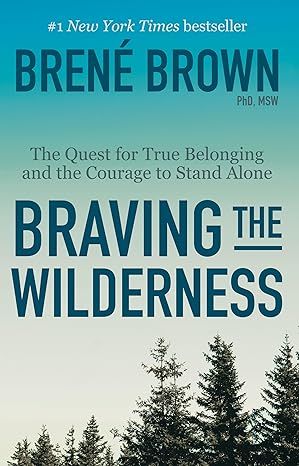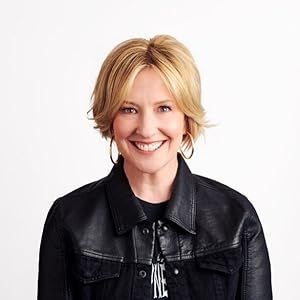Braving the Wilderness: The Quest for True Belonging and the Courage to Stand Alone
4.6 out of 5
14,403 global ratings
#1 NEW YORK TIMES BESTSELLER • REESE’S BOOK CLUB PICK • A timely and important book that challenges everything we think we know about cultivating true belonging in our communities, organizations, and culture, from the #1 bestselling author of Rising Strong, Daring Greatly, and The Gifts of Imperfection
Don’t miss the five-part Max docuseries Brené Brown: Atlas of the Heart!
“True belonging doesn’t require us to change who we are. It requires us to be who we are.” Social scientist Brené Brown, PhD, MSW, has sparked a global conversation about the experiences that bring meaning to our lives—experiences of courage, vulnerability, love, belonging, shame, and empathy. In Braving the Wilderness, Brown redefines what it means to truly belong in an age of increased polarization. With her trademark mix of research, storytelling, and honesty, Brown will again change the cultural conversation while mapping a clear path to true belonging.
Brown argues that we’re experiencing a spiritual crisis of disconnection, and introduces four practices of true belonging that challenge everything we believe about ourselves and each other. She writes, “True belonging requires us to believe in and belong to ourselves so fully that we can find sacredness both in being a part of something and in standing alone when necessary. But in a culture that’s rife with perfectionism and pleasing, and with the erosion of civility, it’s easy to stay quiet, hide in our ideological bunkers, or fit in rather than show up as our true selves and brave the wilderness of uncertainty and criticism. But true belonging is not something we negotiate or accomplish with others; it’s a daily practice that demands integrity and authenticity. It’s a personal commitment that we carry in our hearts.” Brown offers us the clarity and courage we need to find our way back to ourselves and to each other. And that path cuts right through the wilderness. Brown writes, “The wilderness is an untamed, unpredictable place of solitude and searching. It is a place as dangerous as it is breathtaking, a place as sought after as it is feared. But it turns out to be the place of true belonging, and it’s the bravest and most sacred place you will ever stand.”
208 pages,
Kindle
Audiobook
Hardcover
Paperback
Audio CD
First published August 26, 2019
ISBN 9780812985818
About the authors
Brené Brown
Dr. Brené Brown is a research professor at the University of Houston, where she holds the Huffington Foundation Endowed Chair at the Graduate College of Social Work. She also holds the position of visiting professor in management at the University of Texas at Austin McCombs School of Business.
Brené has spent the past two decades studying courage, vulnerability, shame, and empathy. She is the author of six #1 New York Times best sellers and is the host of two award-winning Spotify podcasts, Unlocking Us and Dare to Lead.
Brené’s books have been translated into more than 30 languages, and her titles include Atlas of the Heart, Dare to Lead, Braving the Wilderness, Rising Strong, Daring Greatly, and The Gifts of Imperfection. With Tarana Burke, she co-edited the best-selling anthology You Are Your Best Thing: Vulnerability, Shame Resilience, and the Black Experience.
Brené’s TED talk on the Power of Vulnerability is one of the top five most-viewed TED talks in the world, with over 50 million views. Brené is the first researcher to have a filmed lecture on Netflix, and in March 2022, she launched a new show on HBO Max that focuses on her latest book, Atlas of the Heart.
Brené spends most of her time working in organizations around the world, helping develop braver leaders and more-courageous cultures. She lives in Houston, Texas, with her husband, Steve. They have two children, Ellen and Charlie, and a weird Bichon named Lucy.
Read more
Reviews
Anne’s Kindle Fire
5
Excellent book for adults in the 2024 times
Reviewed in the United States on July 24, 2024
Verified Purchase
Positive supportive great advice …, good stories
O. Merce Brown
5
Brene Brown's Best Book So Far--For Every Reader
Reviewed in the United States on September 13, 2017
Verified Purchase
Like all of Brene Brown's books, this one is life-transforming. I would recommend that everyone--everyone--read each book of hers, in order, and this one last, as it is the culmination of all of the other books. But even better, buy this book, read it, go back and read the others and then read this again! This is the best of all of her books, as well as a prescription for being alive now, of being a citizen, a human being, a kind and caring and loving person--now--at this time in history. It is about how to be brave, kind, and good--no matter what your faith or lack of faith--and of dealing with the fractionalization of our country and of moving towards a re-humanizing (as opposed to dehumanizing) of our communities and families and other relationships, of transforming conflict in brave and true ways.
The book's theme is "true belonging", which the author defines as: "...the spiritual practice of believing in and belonging to yourself so deeply that you can share your most authentic self with the world and find sacredness in both being a part of something and standing alone in the wilderness. True belonging doesn't require you to change who you are; it requires you to be who you are." This might sound a bit unusual, but the book unfolds this idea in beautiful ways that truly will appeal to every reader--no matter what your ideology (including religious and political), no matter what your race, gender, or background.
Read this book; I cannot convey in a review how much it has the potential to change your life for the better. I read it yesterday and today in two sittings and am going back again and again to the writing, the ideas, and the inspiration to me to life more authentically and to be able to connect with others in deeper and braver ways.
Highly recommended.
Read more
757 people found this helpful
Gingerbread
5
A clumsy review, from someone who didn't expect this book to matter....
Reviewed in the United States on September 12, 2017
Verified Purchase
I've been staring at the computer screen for about 10 minutes now, trying to start this review, and having no idea how to do so. I just can't make the words come out, and writing the review terrifies me, and makes me feel a little ill. You see, I didn't buy, or read this book because I know the author or her work. I did both because the content sounded interesting, and because I needed my next big review. Yes, I read this book so I could review it, which is where the ill part enters. I started working toward being an Amazon Top 1000 reviewer about a year ago. Not because I really cared about the rank...it was just a goal. Something intangible I could work toward. And I chose it, because sad though it is, my reviews on Amazon and Goodreads are the last place in this entire world where I am willing to communicate, in any capacity, with other human beings. They're all I have left.
I live a sad life. I have no friends and I'm lonely... So lonely that as I type this I feel like crying, even though I accepted this as my reality a long time ago. I cancelled facebook two years ago. I lost my last real friend three years ago. I struggle to call and make appointments because it requires talking to strangers, and for this reason I also can't go to the grocery store, or the gas station, or any other list of a hundred places that normal people go to have normal lives.
You see, I decided five years ago that I was done with fitting in, and that I'd rather be lonely and alone, than to continue immersing myself in a world I found caustic.
Everywhere I looked people seemed to be shouting, trying to make their voices heard. The most recent clever story on facebook. The most wittily stated opinion. I didn't see kindness, I saw intolerance and rudeness. I saw people ripping each other down through the medium of social media because they didn't have to look that person in the face, and see how their comments hurt them. Then I watched as that attitude seemed to make people less tolerant in the real world as well. I wanted no part of it anymore. From that point on I was standing alone, and that was that. It seemed like a good idea at the time, but as the years have passed, I've cut myself so far off from humanity that it feels like I'm the only person left in my world. It hurts, SO much, but I don't know how to undo it. I don't know how to go back.
At least...I didn't. I know this review is already too long, and all I've done is clumsily muddle my way through it—attempting to express something I don't even know if others will understand. This is frustrating for me, because I don't want to talk about myself, and doing so is terrifying, particularly after so many years of silence. But I didn't know how else to express the impact this book had on me, without first talking about how much pain I've been in, and how nefarious my reasons for reading it in the first place. I got the "standing alone" part down pat. I did that years ago. The part I couldn't find, that maybe I'd never have found on my own, is the part where I know how to belong to something again. Join the world. Feel a connection to life and humanity.
I cried just about the entire duration of this book. I got it because it sounded "interesting", but I feel like it opened up a hole in the side of my sad little world. I didn't think it would apply to me, but it's changed my life. I expected to write an honest, clinical review discussing its contents from a dispassionate point of view. But instead, here I am, still clumsily attempting to convey my feelings in the hopes that some part of this review might encourage even one other person to read this book.
Everyone should read this book. Everyone who wants to stand alone, but still belong. Everyone who already is alone, and wants to be a part of something again. Everyone who is tired of a humanity that is separated. Give it a shot. If nothing else, get the sample chapters, and see if there's something in it that might speak to you.
And if my review is clumsy, I sincerely apologize. Please don't let that turn you off from the book. It changed my life, and I think it can do as much for many.
EDIT: It's been 6 months since I wrote this review, and when I said this book changed my life, it did. Oh, how it did! I got into therapy. I've made some friends who share my interests, and even many of my anxieties. I no longer feel lonely or threatened. If anyone out there struggles as I did, please know that help is available, and change is possible. All it takes is one moment that changes all other moments. For me, that was this book! Thank you, from the bottom of my heart, for all of you who have supported me, and supported each other. Humanity is far more wonderful than I once believed!!!
Read more
10 people found this helpful
Elizabeth Jordan
5
Braving a Better Me
Reviewed in the United States on December 29, 2021
Verified Purchase
Braving the Wilderness takes the gold for my most favorite Brene Brown book yet. It felt the most relatable, connectable, and helpful of them all. Brown talks about how to navigate the current (then and now) polarized political climate, how to empathetically disagree, and come out more connected then disconnected. She emphasizes how important it is for us to belong to ourselves in order to be courageous enough to brave the wilderness. She discusses how the era of social media is disconnecting rather than connecting us. She breaks down how to be strong and soft while staying authentic to who we are.
I absolutely loved how Brown addresses the polarization of political beliefs that have risen in America. She calls it as it is and tells stories of being in positions of the either or “either you're with us or against us” mentality that has become so popular. She shares stories of her experiences in this minefield. These stories connected with me, though I haven’t been in her exact shoes I’ve been in similar shoes. Same style, different color. She discusses how to navigate these conversations to eliminate the either or and encourage conversation and empathy. This is one of the profound parts of the book that really stuck with me.
The other moment of the book that stuck out to me is her realization that social media is pulling humanity apart rather than together. She tells a story of how Facebook aided her in finding her childhood friend but it wasn’t until being with said friend in person that the connections and belonging became spiritual. The stories Brown shares made this book what it is. Those stories made it my favorite. Those stories connected with me on a deeper level. I could tell that her stories made this book more vulnerable for her in turn making this her best book. Brene’s books have made me strive to be a better, bigger, more connected person in so many ways.
Rating: 5 Stars
Favorite Quote: “But the more we’re willing to seek out moments of collective joy and who up for experiences of collective pain—for real, in person, not online–the more difficult it becomes to deny our human connection, even with people we may disagree with.”
Read more
13 people found this helpful
Geddes J
5
Being true to yourself
Reviewed in the United States on January 15, 2024
Verified Purchase
This is an important book for America and the people. It touches sensitive issues in difficult times and it shows there are paths for understanding and civic behavior, and mutual respect.It's a short book, so it is worth readingw.
3 people found this helpful
Aubrie Blake
5
Great Book
Reviewed in the United States on July 23, 2024
Verified Purchase
I love this book!! Brene Brown is such and amazing author!!
Mrs Broccoli
4
Good so far! I feel like it could do more.
Reviewed in the United States on August 18, 2020
Verified Purchase
I'm halfway through the book and I like what I've read so far. It's given me a lot to think about. I've been a fan of Brene Brown's work for several years and watch all of her TEDTalks as I'm sure everyone else who bought this book probably did as well. Even though it's a "short read" kind of book (163 pages), I'm taking my time with it because of how dense the material is. I certainly can read the whole book in a day but I don't think I would really absorb or learn the concepts in a meaningful way to incorporate into my life. What I usually do is read a chapter per week and think about the concepts in that chapter for the whole week while trying to apply it to my life.
One disappointment I have with the book so far is that I wish the book would actually go further in some concepts and suggestions. For example, in her chapter about how "People are Hard to Hate up Close. Move In," she has an interview with a close friend and colleague Michelle Buck who gives some advise on conflict transformation. Their conversation revolves a lot around awareness of the situation (broadly speaking) versus actual strategies to transform the conflict/disagreements. The only good advise I felt that came from that interview in terms of strategies is to say "Tell me more..." in moments that we feel like closing up in an attempt to understand the other person better. I felt like this chapter could've given more strategies to steer a conversation from becoming bitter or too confrontational. I think readers like myself could benefit from this addition.
My overall impression so far of the book is that it's written with really good intentions and definitely a lot of good information for self-reflection, but that it could do more for the reader by providing solid strategies for "Braving the Wilderness" as the book's title says, and give the reader actual applicable conversational tools to bridge gaps with people with differing views.
I'll update my review once I finish reading. :-) So far though, I'm enjoying what the book does have to offer.
Read more
4 people found this helpful
Allison Hawn
4
Worth Braving a Bookstore to Buy
Reviewed in the United States on February 11, 2018
Verified Purchase
I am not normally a self-help or personal improvement book fan. Books like Who Moved My Cheese? usually leave me with an intense urge to head for the hills. It’s not that I don’t believe in self improvement, I just don’t think I can cliché my way to a better state of being or hug myself enough to make paying bills seem like a true joy.
I had caught one of Brene Brown’s TED Talks on shame and had liked it, showing it to both my college students and to women in a domestic violence program with whom I worked. I thought she had some valid points regarding vulnerability and openness, so, despite my misgivings about the premise of the genre overall, I read Brown’s Braving the Wilderness.
I was immediately struck by the thesis of her book, the idea that true belonging doesn’t require us to be who others want us to be, but being who you really are regardless of where you are or who you are surrounded by. This is a thesis that she then breaks down into sections that are easy to follow and implement, showing how only by being willing to be vulnerable and open to others’ points of view will we truly grow in ourselves.
Brown’s points are equally backed by research, that both she and others have conducted, and her own anecdotal narratives. She does an excellent job throughout in presenting historical context and the results of scientific research without bogging down her points or interrupting the almost poetic flow of the writing. As someone in a PhD program, I was glad to see that she did not sacrifice the data and research in favor of flowery maxims, and managed to still make it interesting to those who may not care as much about the data-driven side of things.
The narrative voice that Brown uses in this book is powerful. There are moments that will give you pause as you take a second to absorb what Brown has just told you. Her writing is honest, heartfelt and vulnerable, all of which makes her easy to relate to on a human level. The tone of the book does not come across as a guru on top of the mountain dispersing wisdom, but instead more as a friend who sees your struggles and wants to help you out.
Probably the most significant impact of this book, however, is not so much its call for people to find their inner voices, but the appeal to us to remember the humanity in others. Throughout the book Brown pleads for a more civil society, one where we draw lines in the sand between holding to our own values and resisting the urge to dehumanize others. “There is a line. It’s etched from dignity,” she writes, and then proceeds to chip away at the structures that keep us from reaching out to others in a meaningful way. While the book has great advice on building up to one’s own potential, the biggest impact her book may have is in its ability to help people learn to bridge gaps with those they might not otherwise reach.
One critique I do have for this work is that there were a few places where Brown felt like she might be reaching a bit, not in logical scope, but in word count. There were areas in the book that felt a little repetitive and where it felt like Brown was just trying to make a page out of a paragraph. However, these moments were few, and did not detract much from the overall messages that Brown was trying to get across.
This book is a quick read, but one that will make you think. If you enjoyed books like Duckworth’s Grit, Levitt and Dubner’s Freakonomics, or van Dernoot Lipsky’s Trauma Stewardship, then this book will be right up your alley. Braving the Wilderness is worth braving a trip to the bookstore.
Read more
20 people found this helpful
danielle kirby
4
I learned a lot from this book.
Reviewed in the United States on July 2, 2024
Verified Purchase
Though I do not agree with all of the concepts in the book I did gain a new perspective by reading it. I was also able to take some information away for a PowerPoint presentation on writing consistently and the mindset of the courage needed to write a book.
Gary Moreau, Author
3
Very important topic, but one false dilemma can't resolve another
Reviewed in the United States on October 8, 2017
Verified Purchase
The foundational question behind this book couldn’t be more timely or compelling: Why can’t we get along? Why have we sorted ourselves into fortified ideological camps, relying on weaponized words to keep the marauders from the other camp at bay? In doing so we have not found solace but have paralyzed public debate and social progress. And we’re lonely.
The author is right, of course.
Dr. Brown believes fear is at the heart of the problem. And the solution she advocates is to follow your “wild heart” into the wilderness beyond your encampment. The rules of engagement in the wildnerness, should you encounter like-hearted souls from the other encampment, and you will, are civility, a developed and willing ability to listen, and recognition that what we all seek is real belonging. To find it we must call out BS, be generous, and above all else, hold your ground.
Dr. Brown is a social research scientist. And science, of course, is all about cause and effect. Research science is a protocol for analyzing data, preferably in large amounts, discerning the patterns that emerge, and applying those patterns to larger, related questions. It is a product of deductive logic, often characterized today as reasoned intelligence.
It’s a process and a world view that dominates all of our institutions today. Politicians conduct polls, businesses mine Big Data, and the traditionally soft academic sciences like evolutionary psychology and social science conduct research. All well and good.
There are, however, several limitations to this definition of reasoned intelligence. In the extreme it is assumed to be both infallible and all-inclusive. The conclusions, as a result, tend to be one-dimensional and strongly held. There is little room for Socratic debate.
The potential myopia of the approach is evident in the fact that words come to take on rigid and deistic meaning. Dr. Brown notes, “We are hardwired to believe what we see and to attach meaning to the words we hear.” And, “Dehumanizing always starts with language…”
Language, however, is a human convention. It’s not natural to the universe like rain or oxygen. Words are mere symbols, and while symbols are indeed important, they acquire real meaning only in context. In some languages, like Mandarin, the very meaning of a word, in fact, is often defined by that context.
If it sounds like I’m starting to make the case that “guns don’t kill, people do,” I’m not. I’m making the opposite case. Guns exist for only one purpose—to shoot bullets—and bullets do, as a matter of science, kill people.
Words, however, do not exist in such a single dimension. The belief that they do is at the heart of political correctness, which is ultimately the belief in the rigidity of meaning and all-inclusive intent.
In this case Dr. Brown notes, “Successful dehumanizing, however, creates moral exclusion.” It is, therefore, a short hop to the observation that, “Today we are edging closer and closer to a world where political and ideological discourse has become an exercise in dehumanization.”
And this has given rise to the ultimate false dilemma: �“You are either with us or against us,” that is at the heart of identity politics. It’s an abominable and flawed dilemma that falsely digitizes all opinion. And I fully agree with Dr. Brown in condemning it.
The alternative, however, is not another false dilemma. And here is where I always stumble in my attempts to get to the heart of the very important issue raised by this book. Are words like inclusion, humanity, rehumanization, and underdog digital in their meaning? They are clearly less digital that words like hate, prejudice, and arrogance. Ultimately, however, they are words and someone has to arbitrate their meaning.
The books devotes ample space to what Brown calls “BS’ing.” (She spells out the word but I wasn’t sure the moderator would accept that.) “I love the idea of speaking truth to bullsht…” She continues, “It’s helpful to think of lying as a defiance of the truth and bullshtting as a wholesale dismissal of the truth,” often found in discussions “driven by emotion rather than shared understanding of the facts.”
In this case, Brown knocks uncertainty as a cop-out, in keeping with the scientist’s rational perspective. The opposite of clarity is ignorance and she cites Professor Harry Frankfurt’s work on the topic to prove the point, identifying the culprit as “our being skeptical and denying that we can ever know the truth of how things truly are.” As a denial of the digital perspective, however, that itself is a digital weapon.
The prose on BS’ing, as a result, reminded me of the term first coined by Steward Chaplin in 1900 and popularized by Teddy Roosevelt—“weasel words.” These are the words that suck the meaning out of claims much like the weasel sucks the meat out of the egg while leaving the shell intact. They provide cover for misleading claims and politicians and business executives use them every day.
In the end, I fully agree and support the basic premise of this book. It is a worthy and noble aspiration. I only wish we could focus more on behavior and less on language. If a picture is worth a thousand words a behavior is worth ten thousand pictures. To borrow from the words of Supreme Court Justice Potter Steward, I know hate when I see it. I know prejudice when I see it. And, ultimately, I know fairness when I see it, although that is often perhaps the least digital word in our language; being, as it often is, in the eye of the beholder.
This book is a very good read that I recommend for just about everyone. On balance I am undoubtedly in Dr. Brown’s “group”, as it were. There is, however, an old saying that people will remember you not for what you say or do, but how you made them feel. No one ever lay on their deathbed and said, “Bring me all my stuff.” The need for human connection, as Dr. Brown so eloquently points out, is supreme to all other human needs. (Maslow put it before self-esteem and self-actualization.)
I only hope that we don’t continue to let our words alone define the discussion. That role belongs to the heart, not the tongue. It is the heart that will lead us into Dr. Brown’s wilderness where real diversity thrives.
Read more
29 people found this helpful
Top Brené Brown titles
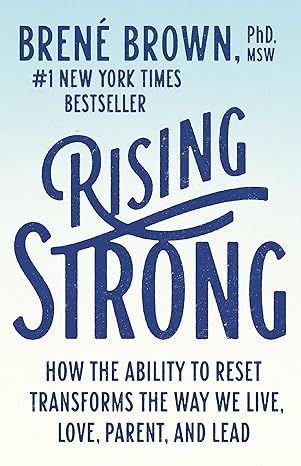
Rising Strong: How the Ability to Reset Transforms the Way We Live, Love, Parent, and Lead
4.7
-
11,216
$0.99
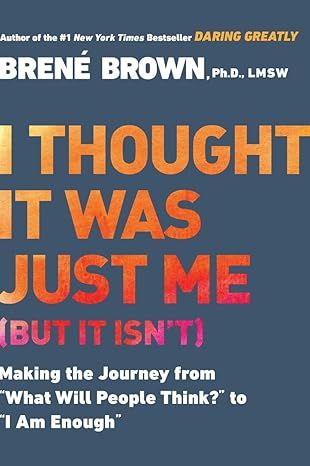
I Thought It Was Just Me (but it isn't): Making the Journey from "What Will People Think?" to "I Am Enough"
4.7
-
7,822
$0.99
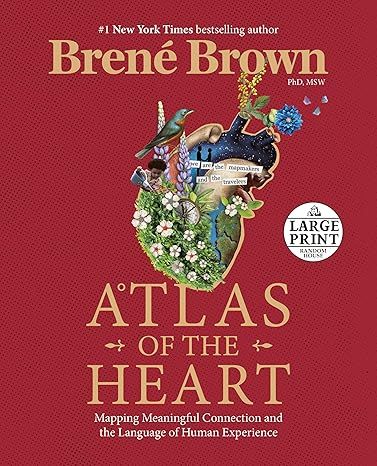
Atlas of the Heart: Mapping Meaningful Connection and the Language of Human Experience (Random House Large Print)
4.7
-
20,467
$0.99
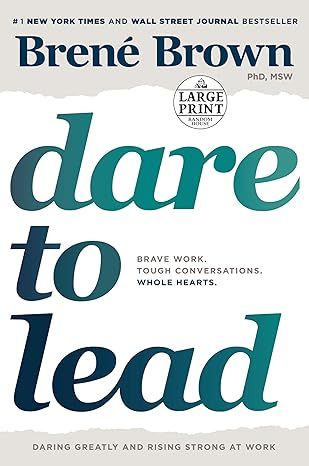
Dare to Lead: Brave Work. Tough Conversations. Whole Hearts.
4.7
-
21,212
$0.99
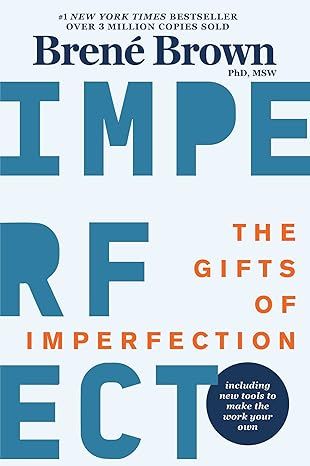
The Gifts of Imperfection: 10th Anniversary Edition: Features a new foreword and brand-new tools
4.7
-
42,318
$0.99
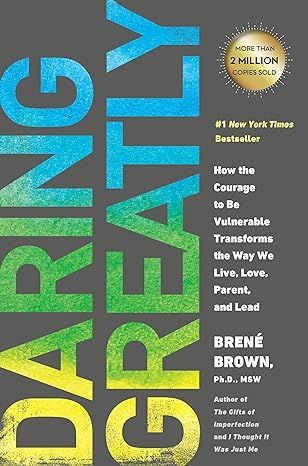
Daring Greatly: How the Courage to Be Vulnerable Transforms the Way We Live, Love, Parent, and Lead
4.7
-
30,025
$4.43
Best Sellers

The Tuscan Child
4.2
-
100,022
$8.39

The Thursday Murder Club: A Novel (A Thursday Murder Club Mystery)
4.3
-
155,575
$6.33

Sapiens: A Brief History of Humankind
4.6
-
140,302
$13.49

The Butterfly Garden (The Collector, 1)
4.3
-
88,556
$9.59

Things We Hide from the Light (Knockemout Series, 2)
4.4
-
94,890
$11.66

The Last Thing He Told Me: A Novel
4.3
-
154,085
$2.99

The Perfect Marriage: A Completely Gripping Psychological Suspense
4.3
-
143,196
$9.47

The Coworker
4.1
-
80,003
$13.48

First Lie Wins: A Novel (Random House Large Print)
4.3
-
54,062
$14.99

Mile High (Windy City Series Book 1)
4.4
-
59,745
$16.19

Layla
4.2
-
107,613
$8.99

The Locked Door
4.4
-
94,673
$8.53
